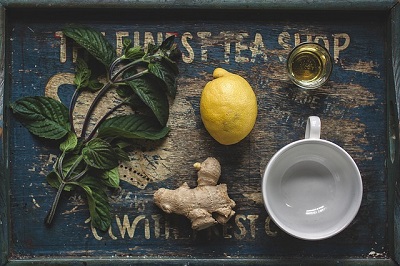
If you suffer from asthma, you’re all too familiar with that awful, panicked feeling when you can’t breathe. Whether you’re waking up wheezing, or reaching for your inhaler all day, you’d do almost anything to breathe better. And there is hope: simple home remedies for asthma can offer real relief.
Standard medical advice for asthma is to take your puffer as needed and avoid triggers. That’s important, but you can be so much more proactive.
Quiz: Is Your Body TOXIC? Take the Test...
(get your free personalized report)
My husband has suffered from asthma his entire life. Unfortunately, marital bliss offered no respite, and there’s nothing worse than watching someone you love struggle to breathe. Together, we started exploring simple home remedies, and we found several that are very effective.
With a combination of the ideas below, he has drastically reduced the amount of asthma medication he takes, and he breathes so much better.
These alternative asthma treatments can help reduce the frequency of symptoms and lessen their severity when they do occur. So if you’d like to cut your reliance on your inhaler and experience fewer asthma attacks, keep reading…
Drink Up

The easiest, first step to treat asthma naturally is drinking more water. We already know that water is so important for detoxification and good health. Water is particularly helpful in treating asthma because it keeps your membranes moist, and it helps regulate your natural lung mucus, too.
Quiz: Is Your Body TOXIC? Take the Test...
(personalized report)
Staying hydrated also plays a key role in regulating the levels of histamines in your body. Much like taking allergy medication, proper hydration acts like a natural antihistamine. Less histamines equals less inflammation, less mucus and better breathing.
Remember that asthma is an inflammatory disease, and water helps combat inflammation. Think of it as lubricating your airways, allowing air and mucus to pass easily without constricting your breathing. Staying hydrated is going to help everything – including air! – flow so much more easily through your body.
To reduce your inflammation even more, try squeezing some antioxidant-rich lemon juice into a glass of water first thing in the morning; and then make sure to keep drinking water throughout the day.
Natural Asthma Treatments

No one’s suggesting you throw out your inhaler, but using some simple, time-tested home remedies for asthma can really lower your dependence on it.
Aromatherapy
First up, aromatherapy. Since asthma goes hand-in-hand with chest congestion, anti-inflammatory chest rubs using marjoram, frankincense or rose oil can help. Lavender can help calm you down after an attack. Eucalyptus oil helps some people break up mucus, but talk to your doctor about a good dosage for you. Use everything sparingly at first, as people with asthma can be sensitive to scents.
Ginger
Ginger is another great, natural asthma supplement. It’s a decongestant high in antioxidants, and it can also relax and open up your airways. Try cooking with it, taking a ginger capsule or drinking ginger tea – just make sure to go organic as much as possible, to avoid pesticides and toxins. Similarly, turmeric is another great anti-inflammatory remedy you can add to your cooking.
Ginko Biloba
Ginko Biloba is another time-tested natural asthma treatment, coming to us from Chinese medicine. Recent studies show promising results that this might help alleviate symptoms, also by decreasing inflammation and opening up the airways.
Honey
And you need honey, honey! Honey is nutrient-dense, offers a host of health benefits, and of course is super yummy, too. It can help soothe even the worst asthma-afflicted throat, suppress coughs and possibly even boost immunity and help you sleep better. Try taking a teaspoon mixed with cinnamon before bed to cut phlegm. Or use it to kick up your smoothies a notch!
Antioxidant-Rich Asthma Diet
While there’s no one accepted ‘asthma diet,’ a healthy diet with plenty of anti-inflammatory, antioxidant-rich foods is going to help keep your lungs happy and healthy, just like the rest of your body.
We all know we need to eat better, but knowing which diet to follow can be confusing. So if you’re looking to treat your asthma, keep it simple: eat as many fruits and vegetables and foods high in omega 3s (like fish and flax seed) as possible. Apples in particular have been singled out as a great food for improving lung function. The “Mediterranean Diet” has also been shown to lessen the severity of asthma.
Natural Stress Relievers

Studies prove what every asthmatic knows: stress can trigger an asthma attack. That’s why it’s so important for people with asthma in particular to learn how to relieve stress in a healthy way. Yoga and meditation are time-tested stress relievers, and they’re a great place to start.
And why not couple meditation with breathing exercises to get the best bang for your asthma-fighting buck? There are many breathing exercises that can help treat asthma naturally. Surely, sitting quietly and working on your breath is going to be soothing for your lungs, your brain, and your whole body. Win-win-win.
Whatever you do, don’t get stressed searching for the perfect stress-buster. Maybe meditation and yoga aren’t a good fit for you, and that’s ok. Try to find a stress reliever you love – whether it’s a bubble bath after work, meeting your friends for coffee, or Sunday afternoon movie binges. Find what works for you, and be sure to incorporate it as much as possible into your regular routine.
Reduce Your Reliance On Your Inhaler
Sometimes, the feelings of restricted breathing and stress get confused and conflated. That puff can seem like a quick fix. It’s all too easy to take your inahler, when all we really needed was to calm down.
And sometimes, the feeling of needing your inhaler will pass – if you let it.
Your rescue inhaler is a necessary tool, but overusing it can actually make your asthma worse. The more you use it, the more you need it, creating that proverbial viscous cycle. You probably find that it can irritate your throat and cause more phlegm, too.
Cutting your reliance on your reliever inhaler is a journey. And it’s not always easy. Just like dieting sometimes requires a little discipline, learning to sit through an episode of airlessness does, too.
Especially if you’ve had asthma since childhood, reaching for your puffer becomes an instinctual habit. Your puffer works so well, and feeling tight in the chest feels so bad, that you take it without thinking. Even when you just feel slightly uncomfortable.
How badly do you need it? Can you sit still for a few minutes, try to breathe calmly, and let the moment pass? Some people also find that caffeine works to relax the lungs during an attack. Try seeing if a cup of coffee will help you breathe more easily.
If you still need your inhaler after a minute or two, take it, of course. But the more you learn to sit through that uncomfortable feeling, the more you’ll see that you have more control over your breathing than you realize. And that’s really empowering.
And Finally, Keep Your Mouth Shut!
Breathing through your mouth can irritate your asthma. It makes sense – anything that irritates your throat and mouth, dries you out and gets you coughing, can potentially make your symptoms worse. So try to become conscious of how you breathe. Make sure to always breathe through your nose, and as calmly as possible. This is especially true while exercising.
The key to home remedies for asthma is keeping an open mind and sticking to natural treatments that are healthy in their own right. Everyone’s symptoms are unique, so everyone will respond to alternative therapies differently.
Become a student of your own body, and keep an active asthma journal. If you don’t see an improvement in 6-8 weeks of a new remedy, scratch it and move on to the next. Eventually, you’re going to discover exactly which natural asthma remedies work for you. And your lungs will thank you for it.
